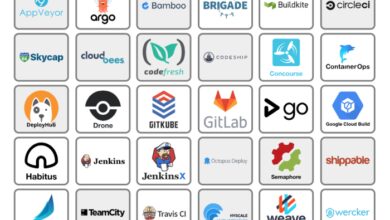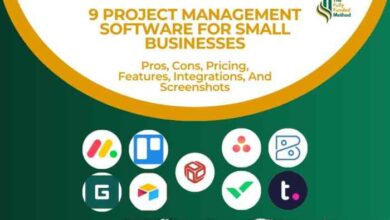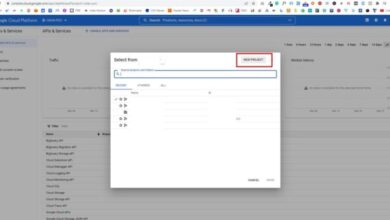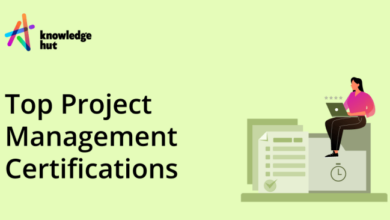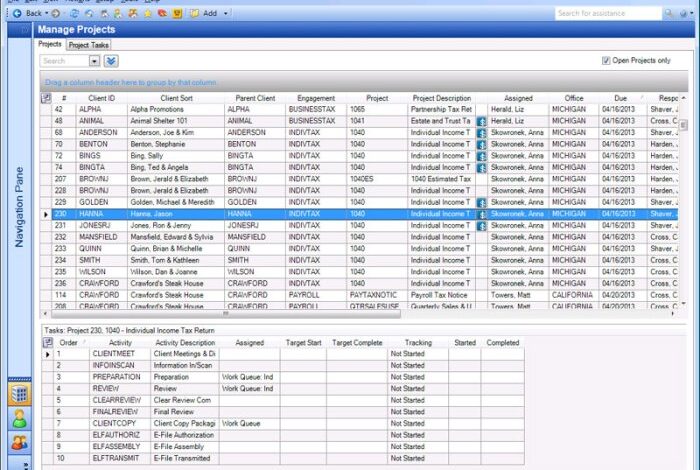
Accounting Project Management Software: Streamlining Your Finances
Accounting project management software has revolutionized the way businesses handle their finances, bringing a level of organization and efficiency previously unimaginable. Imagine a world where all your financial data is readily accessible, projects are meticulously tracked, and budgets are automatically monitored.
This is the reality that accounting project management software offers, empowering businesses to make informed decisions, optimize resource allocation, and ultimately achieve greater financial success.
This software encompasses a range of functionalities, including task management, time tracking, budgeting, and reporting, designed to streamline accounting processes, improve collaboration, and enhance data visibility. From small startups to large enterprises, accounting project management software has become an indispensable tool for organizations seeking to gain control over their finances and achieve their financial goals.
Introduction to Accounting Project Management Software
Accounting project management software is a specialized type of software designed to streamline and automate the financial aspects of projects. It helps businesses manage budgets, track expenses, monitor profitability, and generate financial reports for project stakeholders.Accounting project management software is crucial for businesses that handle multiple projects simultaneously, as it provides a centralized platform for managing financial data.
It helps to ensure accurate financial reporting, improve cost control, and facilitate better decision-making for project success.
Key Features and Functionalities
Accounting project management software offers a wide range of features and functionalities to support efficient project financial management. Here are some key features:
- Budgeting and Forecasting:Software allows users to create detailed project budgets, track expenses against those budgets, and forecast future costs. It helps identify potential cost overruns and make necessary adjustments.
- Time Tracking and Billing:The software enables users to track time spent on projects, allocate costs to specific tasks, and generate invoices for clients. This helps improve billing accuracy and streamline the invoicing process.
- Expense Management:Users can record and categorize expenses, generate expense reports, and track reimbursements. The software integrates with expense management tools to automate expense tracking and reconciliation.
- Financial Reporting:Accounting project management software generates various financial reports, including profit and loss statements, balance sheets, and cash flow statements. These reports provide insights into project profitability and financial performance.
- Project Collaboration:Some software solutions offer collaboration features that allow team members to share financial data, track progress, and communicate effectively. This facilitates better teamwork and improves financial transparency.
Types of Accounting Project Management Software
The market offers a variety of accounting project management software options, each with its own strengths and features. Here are some common types:
- Standalone Accounting Software:These solutions are designed specifically for accounting project management and offer comprehensive features for budgeting, expense tracking, and reporting. Examples include QuickBooks, Xero, and FreshBooks.
- Integrated Project Management Software:These platforms combine project management and accounting functionalities into a single solution. Examples include Asana, Monday.com, and Wrike. These solutions often offer limited accounting features compared to standalone accounting software.
- Cloud-Based Software:Cloud-based accounting project management software is accessible from any device with an internet connection. It offers scalability, flexibility, and real-time data synchronization. Examples include Zoho Projects, Jira, and Basecamp.
Benefits of Using Accounting Project Management Software
In today’s dynamic business landscape, efficient accounting practices are paramount to success. Accounting project management software emerges as a valuable tool that can significantly enhance the efficiency and accuracy of financial operations. By automating tasks, improving collaboration, and providing real-time insights, this software empowers businesses to make informed decisions and achieve their financial goals.
Streamlined Accounting Processes
Accounting project management software can streamline accounting processes by automating repetitive tasks and eliminating manual errors.
- Invoice Generation and Management:Software automates invoice creation, sending, and tracking, reducing manual effort and ensuring timely payments.
- Expense Tracking and Reporting:Software simplifies expense tracking and reporting by providing a centralized platform for capturing and categorizing expenses.
- Financial Reconciliation:Automated reconciliation features help identify discrepancies and ensure accurate financial reporting.
Enhanced Collaboration and Communication
Effective communication and collaboration are essential for successful accounting operations. Accounting project management software facilitates seamless communication and collaboration among team members, improving efficiency and accuracy.
- Centralized Platform:The software provides a centralized platform for all accounting-related documents, ensuring that everyone has access to the latest information.
- Real-time Communication:Features like instant messaging and task assignments enable real-time communication and collaboration, eliminating delays and misunderstandings.
- Task Management:The software facilitates task assignment, tracking, and completion, ensuring that all tasks are completed on time and within budget.
Enhanced Data Visibility and Reporting
Accounting project management software provides enhanced data visibility and reporting capabilities, enabling businesses to gain valuable insights into their financial performance.
- Real-time Financial Data:Software provides real-time access to financial data, allowing businesses to monitor their financial performance in real-time.
- Customizable Reports:Businesses can create customized reports to track key performance indicators (KPIs), analyze trends, and make informed decisions.
- Data Visualization:Data visualization tools allow businesses to present financial data in a clear and concise manner, facilitating easy understanding and interpretation.
Key Features of Accounting Project Management Software
Accounting project management software provides a comprehensive set of tools that streamline and optimize accounting projects. These features go beyond basic accounting functions and offer a centralized platform for managing tasks, tracking time, controlling budgets, and generating insightful reports.
Task Management
Task management is a cornerstone of effective project management. Accounting project management software offers robust task management capabilities, enabling teams to break down complex projects into manageable tasks. This ensures that all project components are addressed and that progress can be tracked effectively.
- Task Creation and Assignment:Users can create tasks, assign them to specific team members, and set due dates. This ensures that everyone understands their responsibilities and deadlines.
- Task Prioritization:Features like task prioritization allow teams to focus on the most critical tasks first, ensuring that projects stay on track and deadlines are met.
- Sub-tasks and Dependencies:The ability to create sub-tasks and define dependencies between tasks provides a clear view of the project’s workflow. This helps identify potential bottlenecks and ensures that tasks are completed in the correct order.
- Task Progress Tracking:Users can track the progress of each task, making it easy to identify tasks that are falling behind schedule and adjust project plans accordingly.
- Task Collaboration:Features like task comments and notifications facilitate seamless communication between team members, ensuring everyone is on the same page and can collaborate effectively.
Time Tracking
Accurate time tracking is crucial for accounting projects. Accounting project management software simplifies time tracking, providing a clear picture of how time is spent on different tasks and projects.
- Automatic Time Tracking:Some software solutions offer automatic time tracking, recording the time spent on specific tasks. This eliminates the need for manual time entries and reduces the risk of errors.
- Manual Time Tracking:Users can manually log their time spent on tasks, providing flexibility for situations where automatic tracking is not feasible.
- Time Tracking Reports:The software generates detailed reports on time spent on tasks, projects, and clients. This data helps identify areas for improvement and optimize resource allocation.
- Time Tracking Integrations:Some software solutions integrate with other tools, such as project management platforms or CRM systems, to provide a more comprehensive view of time utilization.
Budgeting
Budgeting is an essential aspect of project management, and accounting project management software offers robust budgeting tools. These tools allow teams to create detailed budgets, track expenses, and monitor budget performance.
- Budget Creation:Users can create detailed budgets for projects, allocating funds to different tasks and activities.
- Expense Tracking:The software allows users to track expenses against the budget, providing real-time visibility into budget performance.
- Budget Variance Reporting:The software generates reports that highlight budget variances, allowing teams to identify areas where costs are exceeding or falling short of the budget.
- Budget Forecasting:Some software solutions offer budget forecasting capabilities, allowing teams to predict future budget needs based on historical data and project trends.
Reporting
Reporting is crucial for providing insights into project performance and making informed decisions. Accounting project management software offers comprehensive reporting capabilities, allowing teams to generate various reports on different aspects of their projects.
- Project Progress Reports:These reports provide a detailed overview of project progress, highlighting key milestones, tasks completed, and remaining tasks.
- Time Tracking Reports:These reports show how time is spent on different tasks, projects, and clients, providing insights into resource utilization and efficiency.
- Budget Reports:These reports provide a detailed overview of project budgets, including actual expenses, budget variances, and forecasted costs.
- Financial Reports:Some software solutions generate financial reports, providing insights into profitability, revenue, and expenses.
- Customizable Reports:The ability to create customizable reports allows teams to generate reports that meet their specific needs and reporting requirements.
Implementation and Integration of Accounting Project Management Software
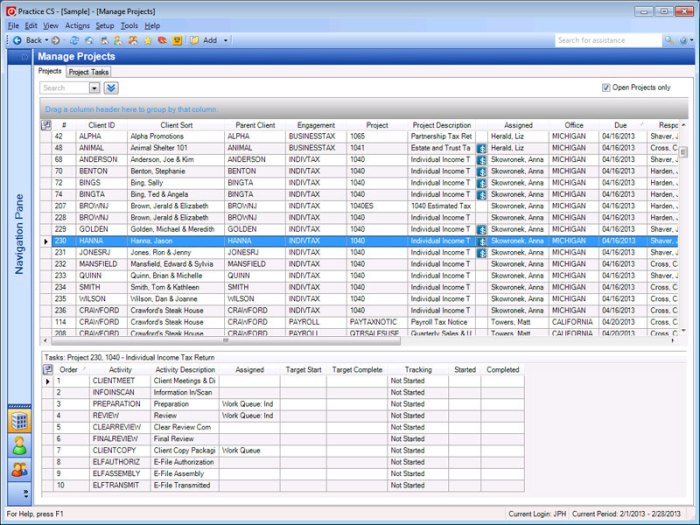
Implementing accounting project management software is a crucial step in streamlining financial processes and enhancing project visibility. This involves careful planning, seamless integration with existing systems, and effective user training to ensure successful adoption.
Integrating with Existing Accounting Systems
Integrating the new software with existing accounting systems is essential for data consistency and efficient workflow.
- Data Migration:Transferring data from legacy systems to the new software requires careful planning and execution. This involves identifying relevant data fields, ensuring data integrity, and minimizing disruptions to ongoing operations.
- API Integration:Application Programming Interfaces (APIs) allow for seamless data exchange between the new software and existing accounting systems. This enables real-time data synchronization, eliminating manual data entry and minimizing errors.
- Data Mapping:Establishing clear data mapping between the two systems is critical for accurate data transfer. This involves identifying corresponding data fields and ensuring data integrity during the migration process.
Successful Adoption and User Training
Effective user training is crucial for successful adoption of the new software.
- Training Programs:Comprehensive training programs should be designed to cover all aspects of the software, including basic navigation, core functionalities, and advanced features.
- Onboarding Process:A structured onboarding process should be implemented to guide users through the initial stages of using the software. This may include interactive tutorials, guided demonstrations, and personalized support.
- Ongoing Support:Providing ongoing support through FAQs, user manuals, and dedicated help desks ensures users have access to assistance whenever needed.
Best Practices for Using Accounting Project Management Software
Harnessing the full potential of accounting project management software requires more than simply adopting the technology. Implementing best practices ensures efficient project execution, improved collaboration, and optimal resource utilization.
Organizing and Managing Accounting Projects
Effective project organization within the software is crucial for maintaining clarity and control.
- Establish Clear Project Structures:Define project phases, tasks, and milestones within the software’s framework. This allows for a structured breakdown of complex projects, facilitating progress tracking and resource allocation. For example, a project for financial statement audits could be divided into phases like planning, fieldwork, and reporting, with each phase containing specific tasks and deadlines.
- Utilize Project Templates:Leverage pre-defined templates for recurring projects to streamline setup and ensure consistency. This reduces repetitive work and minimizes the risk of errors. Templates can be created for common tasks like budget preparation, tax filing, or financial statement analysis, ensuring a standardized approach.
Accounting project management software can be a game-changer for businesses, helping streamline processes and optimize resource allocation. It’s fascinating to see how similar principles are applied in other industries, like beverage distribution. For example, Mitchell Companies enhanced their distribution performance using Descartes’ routing solution , demonstrating how technology can optimize logistics and improve efficiency.
Just like accounting project management software helps you stay on top of your financial projects, these routing solutions can help businesses in other sectors achieve their goals.
- Implement Robust Task Management:Assign tasks to team members, set due dates, and track progress using the software’s task management features. This provides a centralized view of project activities and enables proactive management of potential delays. For instance, a team member responsible for preparing a financial statement analysis can be assigned specific tasks like gathering data, performing calculations, and drafting the report, with deadlines set for each task.
Effective Communication and Collaboration
Open and efficient communication is paramount for successful project execution.
- Centralized Communication Hub:Utilize the software’s built-in communication tools for project-related discussions, announcements, and file sharing. This ensures all team members are kept informed and facilitates collaborative decision-making. For instance, the software’s message board can be used to share updates on project progress, discuss potential challenges, and collaborate on key decisions.
Accounting project management software can be a game-changer for keeping your projects on track and within budget. But let’s face it, sometimes you just need a break from spreadsheets and deadlines. That’s when I like to tune in to at home with danny brito for some lighthearted entertainment.
After a little dose of laughter, I’m always refreshed and ready to tackle those accounting projects with renewed focus.
- Real-Time Collaboration:Leverage features that enable simultaneous document editing and collaboration. This fosters a seamless workflow and eliminates the need for multiple versions of documents. For example, team members can work on a financial report simultaneously, making changes and providing feedback in real-time, ensuring a consistent and updated document.
- Automated Notifications:Set up notifications for task updates, deadlines, and important announcements. This ensures timely information delivery and minimizes the risk of missed deadlines or important information. For instance, a notification can be set up to alert team members when a task is overdue or when a new document is uploaded to the project folder.
Optimizing Resource Allocation and Project Timelines
Resource allocation and timeline management are crucial for efficient project execution.
Keeping track of budgets and deadlines is crucial for any accounting project, just like ensuring you don’t miss out on the stunning new Copper Coast Collection at Waterford, shop the new copper coast collection at waterford. The right accounting project management software can help you streamline workflows, manage resources effectively, and ultimately, deliver successful projects on time and within budget.
- Resource Allocation and Tracking:Utilize the software’s resource management features to assign team members to tasks based on their skills and availability. This ensures optimal resource utilization and minimizes potential conflicts. For example, a senior accountant with expertise in tax compliance can be assigned to tasks requiring specialized knowledge, while a junior accountant can handle tasks requiring basic accounting skills.
- Project Timeline Management:Create and manage project timelines using the software’s calendar and Gantt chart features. This provides a visual representation of project milestones, deadlines, and dependencies, enabling proactive identification and mitigation of potential delays. For instance, a Gantt chart can visually depict the interdependencies between different tasks, highlighting critical paths and potential bottlenecks.
- Time Tracking and Reporting:Implement time tracking features to monitor project hours spent on specific tasks. This provides valuable insights into project efficiency and helps identify areas for improvement. For example, time tracking can reveal that a specific task is taking longer than anticipated, prompting further analysis and potential adjustments to the project plan.
Case Studies and Real-World Examples: Accounting Project Management Software
Accounting project management software has become an indispensable tool for businesses of all sizes, helping them streamline processes, improve efficiency, and enhance project outcomes. To understand the real-world impact of these solutions, let’s explore some case studies and examples of how businesses have successfully implemented and leveraged accounting project management software.
Impact of Accounting Project Management Software on Project Outcomes
The implementation of accounting project management software can significantly impact project outcomes in several ways. One of the most notable impacts is the improved accuracy and efficiency of financial reporting. By automating tasks like expense tracking, time recording, and invoice generation, businesses can eliminate manual errors and reduce the time spent on these processes.
This leads to more accurate financial data, which in turn provides a clearer picture of project performance and profitability.
Case Study: Construction Company Streamlines Project Budgeting and Cost Control
A construction company was struggling to manage project budgets and track costs effectively. They were relying on manual spreadsheets and processes, which were prone to errors and difficult to maintain. By implementing accounting project management software, the company was able to:
- Automate expense tracking and invoice generation, reducing manual effort and errors.
- Gain real-time visibility into project costs, enabling proactive cost control and budget management.
- Generate accurate reports and dashboards, providing insights into project performance and profitability.
The software helped the company streamline its budgeting process, improve cost control, and achieve significant savings. This improved efficiency and accuracy also enabled the company to make better informed decisions regarding project bidding and resource allocation.
Case Study: Software Development Company Enhances Collaboration and Communication
A software development company was facing challenges with team collaboration and communication. They were using a mix of tools and platforms, which made it difficult to track progress and ensure everyone was on the same page. The company implemented accounting project management software that provided a central platform for:
- Task management and assignment, ensuring clarity of roles and responsibilities.
- Real-time communication and collaboration, facilitating efficient information sharing.
- Progress tracking and reporting, enabling visibility into project status and performance.
The software helped the company improve team collaboration, communication, and productivity. It also provided a centralized platform for project documentation and knowledge sharing, enhancing the company’s overall project management capabilities.
Case Study: Marketing Agency Improves Client Billing and Revenue Management
A marketing agency was struggling to manage client billing and revenue effectively. They were using a manual system that was time-consuming and prone to errors. By implementing accounting project management software, the agency was able to:
- Automate invoice generation and tracking, reducing manual effort and errors.
- Improve client communication and payment collection, ensuring timely revenue generation.
- Gain real-time insights into client billing and revenue performance, enabling better financial planning and decision-making.
The software helped the agency streamline its billing process, improve client satisfaction, and increase revenue. It also provided valuable insights into client spending patterns, enabling the agency to optimize its pricing strategies and identify opportunities for growth.
Future Trends in Accounting Project Management Software
The accounting project management software landscape is constantly evolving, driven by technological advancements and the increasing need for greater efficiency and accuracy in financial management. As we move forward, several key trends will shape the future of accounting project management software, impacting how businesses manage their finances and projects.
Artificial Intelligence and Automation
The integration of artificial intelligence (AI) and automation into accounting project management software is revolutionizing the way financial tasks are performed. AI-powered tools can automate repetitive tasks, such as data entry, invoice processing, and expense tracking, freeing up accountants to focus on more strategic initiatives.
- AI-powered data analysis: AI algorithms can analyze vast amounts of financial data, identifying patterns and trends that would be difficult or impossible for humans to detect. This can help businesses make more informed decisions about budgeting, forecasting, and resource allocation.
- Automated reporting and dashboards: AI can generate customized reports and dashboards that provide real-time insights into project performance and financial health. This enables businesses to track progress, identify potential risks, and make adjustments as needed.
- Fraud detection and prevention: AI can be used to detect and prevent fraudulent activity by analyzing patterns in financial transactions and identifying anomalies. This can help businesses protect their assets and mitigate financial risks.
Cloud-Based Accounting Software
Cloud-based accounting project management software is becoming increasingly popular, offering several advantages over traditional on-premises solutions. Cloud-based software is accessible from anywhere with an internet connection, making it ideal for businesses with remote teams or employees who travel frequently.
- Enhanced collaboration: Cloud-based software enables seamless collaboration between team members, regardless of their location. This allows for real-time updates, shared access to documents, and improved communication.
- Scalability and flexibility: Cloud-based software can be easily scaled up or down as business needs change. This eliminates the need for expensive hardware upgrades and provides businesses with the flexibility to adapt to evolving requirements.
- Data security and backup: Cloud providers typically offer robust security measures and data backup services, ensuring the safety and integrity of business data. This reduces the risk of data loss due to hardware failure or cyberattacks.
Integration with Other Business Applications
Modern accounting project management software is designed to integrate seamlessly with other business applications, such as CRM, ERP, and project management tools. This integration enables businesses to streamline their workflows, eliminate data silos, and gain a comprehensive view of their operations.
- Real-time data synchronization: Integrated systems allow for real-time data synchronization, ensuring that all applications are working with the same information. This eliminates the need for manual data entry and reduces the risk of errors.
- Automated workflows: Integration enables businesses to automate workflows, such as invoice generation, expense reporting, and project billing. This can significantly improve efficiency and reduce manual effort.
- Improved decision-making: By integrating with other business applications, accounting project management software can provide a more holistic view of business operations. This enables businesses to make more informed decisions based on real-time data and insights.
Personalized User Experiences
Accounting project management software is increasingly focused on providing personalized user experiences. This includes features such as customizable dashboards, personalized reporting, and intuitive interfaces that are tailored to the specific needs of individual users.
- User-friendly interfaces: Modern accounting software features intuitive interfaces that are easy to navigate and understand. This makes it easier for users to find the information they need and perform tasks efficiently.
- Customizable dashboards: Users can customize their dashboards to display the information that is most relevant to their role. This provides a personalized view of key performance indicators and allows users to track progress towards their goals.
- Mobile accessibility: Many accounting project management software solutions offer mobile apps that allow users to access their data and manage their finances from anywhere. This provides greater flexibility and convenience.
Blockchain Technology
Blockchain technology is emerging as a potential game-changer for accounting project management software. Blockchain’s decentralized and secure nature can enhance transparency, security, and efficiency in financial transactions.
- Enhanced transparency: Blockchain provides a transparent and immutable record of all financial transactions. This can help businesses track the flow of funds, improve audit trails, and reduce the risk of fraud.
- Improved security: Blockchain’s decentralized nature makes it highly resistant to hacking and data breaches. This can enhance the security of financial data and protect businesses from financial losses.
- Streamlined processes: Blockchain can automate and streamline financial processes, such as invoice processing and payment reconciliation. This can reduce manual effort and improve efficiency.


